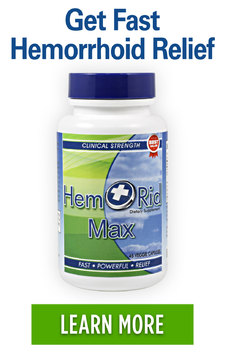Will Hemorrhoids Go Away on Their Own?
Posted on 11 June 2024 by Musab Zubair
Share this post
Hemorrhoids, those swollen veins around the rectum and anus, can be a source of discomfort and worry. A common question people ask is: will hemorrhoids disappear without treatment? This blog post delves into the factors affecting how long hemorrhoids last and explores strategies for promoting healing, preventing recurrence, and knowing when to seek medical attention. Find out if your hemorrhoids might go away on their own and discover tips for lasting comfort.
The Uncomfortable Truth About Hemorrhoids
Hemorrhoids are a prevalent condition, affecting millions of people globally. While not life-threatening, they can cause a range of unpleasant symptoms, including pain, bleeding, and the dreaded itch. But one question lingers in the minds of many: will hemorrhoids simply vanish on their own, or is treatment necessary?
The truth is, there's no one-size-fits-all answer. The duration and severity of hemorrhoids depend on various factors, and whether they disappear on their own is a case-by-case scenario. This blog post sheds light on the factors influencing how long hemorrhoids last and offers helpful strategies for promoting healing and preventing future occurrences.
Understanding Hemorrhoids: Grades and Severity
Hemorrhoids are classified into grades based on their location and protrusion:
- Grade 1: Internal hemorrhoids remain inside the rectum and typically cause minimal discomfort.
- Grade 2: Internal hemorrhoids protrude slightly during bowel movements but retract on their own.
- Grade 3: Internal hemorrhoids protrude during bowel movements and may require manual or straining to push them back inside.
- Grade 4: Hemorrhoids protrude permanently outside the anus.
The Disappearing Act: When Hemorrhoids Resolve Naturally
The good news is that many Grade 1 and some Grade 2 hemorrhoids can resolve on their own within a few days or weeks with home care. Here's what can contribute to spontaneous healing:
- Reduced Straining: Avoiding straining during bowel movements is crucial. Straining increases pressure in the veins around the rectum, worsening hemorrhoids.
- Dietary Changes: A diet rich in fiber (fruits, vegetables, whole grains) promotes softer stools and reduces straining.
- Hydration: Drinking plenty of fluids keeps stools soft and prevents constipation, another factor contributing to hemorrhoids.
- Sitz Baths: Warm sitz baths (soaking your lower body in warm water for 10-15 minutes) can soothe inflammation and promote healing.
- Over-the-counter Pain Relief: Medications like acetaminophen or ibuprofen can help manage pain associated with hemorrhoids.
Factors Affecting Hemorrhoid Duration: When They Might Linger
While some hemorrhoids might disappear naturally, several factors can influence their duration:
- Severity: As mentioned earlier, Grade 3 and 4 hemorrhoids are less likely to resolve on their own and might require medical intervention.
- Underlying Conditions: Chronic constipation, pregnancy, and obesity can worsen hemorrhoids and hinder their natural healing.
- Lifestyle Habits: Lack of exercise, a sedentary lifestyle, and poor dietary choices can prolong the presence of hemorrhoids.
Beyond Home Remedies: When to Seek Medical Attention
While home care can be effective for some cases, there are situations where seeking medical attention is essential:
- Severe Pain or Bleeding: If you experience severe pain or persistent bleeding, consult a doctor.
- Hemorrhoids That Don't Improve: If home remedies haven't provided relief within a few weeks, see a doctor for evaluation and treatment options.
- Prolapsed Hemorrhoids: Hemorrhoids that remain prolapsed outside the anus (Grade 4) require medical attention.
Treatment Options for Persistent Hemorrhoids:
If your hemorrhoids persist or cause significant discomfort, various treatment options are available:
- Rubber Band Ligation: This minimally invasive procedure cuts off blood supply to internal hemorrhoids, causing them to shrink and eventually fall off.
- Sclerotherapy: An injection of a solution into the hemorrhoid shrinks the tissue.
- Infrared Coagulation: This procedure uses heat to shrink hemorrhoids.
- Hemorrhoidectomy: In severe cases, surgical removal of hemorrhoids might be necessary done through hemorrhoidectomy.
Preventing Future Flare-Ups: Keeping Hemorrhoids at Bay
The good news is that there are ways to prevent hemorrhoids altogether:
- High-Fiber Diet: A diet rich in fiber is key to preventing hemorrhoids by promoting soft stools and reducing straining.
- Regular Exercise: Aim for at least 30 minutes of moderate-intensity exercise most days of the week to maintain good bowel movement.




